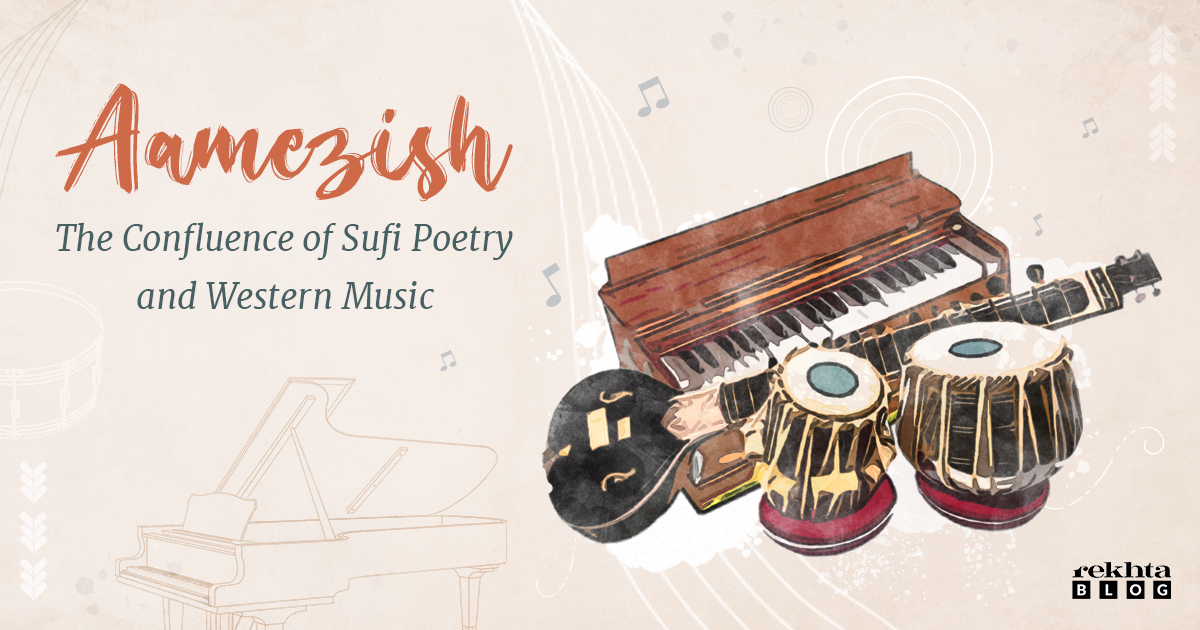
Aamezish: The Confluence of Sufi Poetry and Western Music
Yes, it’s a known that today is International Yoga Day. What’s less-known though is that this 7-year-old ceremony has quietly eclipsed another 40-year-old event – The World Music Day.
Poetry and music share an equation that is analogous to that of a heart and mind; one of them throbs while the other thrives. Being fascinated with Persian Sufi poetry and Western classical music has often seen me scouring deep beneath the bottom of the internet-ocean and coming out with pearls undiscovered.
So, here are my findings!
Coldplay- Bani Adam
Recently, my quest for these pearls was rekindled in the unlikeliest of ways as I chanced upon one of Coldplay’s latest releases, ‘Bani Adam’. For the uninitiated, Coldplay is one of the biggest rock bands in the world from the UK, and Bani Adam (Children of Adam, or Human Being) is a poem written by the 12th-century Persian poet Sheikh Saadi and appears in his book Gulistan. The poem reads:
بنیآدم اعضای یک پیکرند
که در آفرينش ز یک گوهرند
چو عضوى بهدرد آورَد روزگار
دگر عضوها را نمانَد قرار
تو کز محنت دیگران بیغمی
نشاید که نامت نهند آدمی
The sons of Adam are parts of one body
Who are created from the same pearl
When time inflicts pain on one part
The others are put in discomfort
You, who aren’t sad for others pains
Can’t be named as ‘Human Being’
Imbued with the sense of universal brotherhood, Saadi’s poem, written about 800 years ago from today, possesses an undying passion that has become the very essence of a modern-day rock number.
The charm of venturing into this never-before-stepped-in realm is that one isn’t only introduced to cross-cultural confluences but also learns how intricately intertwined the anatomy of art is.
Niyaz- Tamanna
Another music group that I unearthed was Niyaz, an Iranian-Canadian duo of musicians. Their music is charged with modern sounds and electronic beats but inspired by the poetics of the classical Sufi masters like Rumi, Shams Tabrizi, and Amir Khusrau, among others. Although they have several tracks in Persian, the one which struck a chord with me was ‘Tamanna’, which turned out to be this massively famous Urdu ghazal by Khwaja Mir Dard:
mira ji hai jab tak tiri justuju hai
zabaan jab talak hai yahi guftugu hai
Sir Granville Bantock- Opera on Omar Khayyam’s Rubaiyat
Now, the first two inclusions in this playlist are relatively modern numbers, but this one is purely Western classical. Omar Khayyam and his quatrains (rubaiyat) are known to all. The Western side of the world, however, was introduced to him through the English poet and writer Edward Fitzgerald who thoroughly translated Khayyam’s Rubais in his celebrated work, ‘The Rubaiyat of Omar Khayyam’. As his works traveled the rest of Europe, they profoundly influenced other craftsmen, well beyond the preserves of poetry.
One such master craftsman was Sir Granville Bantock (1868-1946), an English classical music composer. He picked up Fitzgerald’s translations and was seemingly so moved by them that he set Khayyam’s paraphrased poems into music, and not just any music but opera! Check it out:
This piece, called a ‘movement’ in classical music, spans over two long hours! Obviously, it is not something which a listener can consume in one go, but how I like to take in this mammoth opera is while letting it play in the background and reading Khayyam in Persian! Try for yourself, it is a treat. Oh, and here is one of my favorite Khayyam verses from this piece:
saaqi mai-e-maarifat mara makaramat ast
dar mashrab-e-be-maarifatan maasiyat ast
be-maarifat aadmi che-kar aayad hech
maqsood ze-aadmi hami maarifat ast
Also, you can read and find the above quatrain along with its prose translation at Sufinama.
Erich J. Wolf- Hafiz, in German, set to music
From one great composer to another, from one master poet to another, and from one amazing piece of classical music to another; just shorter than the former! Moreover, this one is so rare that you won’t find it on YouTube at all, just hear it out:
Haunting, isn’t it?
Erich’s story is strikingly similar to that of Sir Granville’s; only the character-names are different. If it’s need to be said at all, Hafiz’s poetry is addictive. And this addiction found its way through Goethe’s reverence of Hafiz to another German poet Georg Friedrich Daumer, who extensively translated him from Persian into German. Daumer’s rendering of Hafiz became the impetus to German Pianist Erich J. Wolf’s composition titled ‘Lieder 9-10’, a track in which Hafiz’s infectious tenor resonates inside out.
Those of you wondering which original work of Hafiz is put to music, here is the answer:
saal-haa dil talab-e-jaam-e-jam az maa mii-kard
aan-che Khud daasht ze begaana tamanna mii-kard
For Years the heart inquired Jamshed’s magical cup from me
What it possessed itself, it asked from a stranger, constantly
You can check out the entire Ghazal here at Sufinama.
Augusta Read Thomas- Rumi Settings
Of all classical Persian poets, Rumi’s impact outside of Persia has been the greatest. There have been so many adaptations of Rumi’s heartrending poems that it might take a list of its own to enumerate. One of the choicest of all these compositions is the one below:
Augusta, one of America’s most decorated composers, accurately turns Rumi’s words into music. Thanks to Sufinama, here they are for everyone to read “At night, I open the window…”. It is clear how Rumi’s sheer other-worldly pathos penetrates deep into the composer’s heart, for the piece comes out exactly the same. Personally, this is the sort of music that can be defined as the very sound of silence, something that had perhaps possessed Rumi, too.
Hopefully, this little playlist helps evoke an interest in those looking to explore music unheard-of. Also, the blog was just a humble effort to show that these adapted musical pieces aren’t merely examples of Persian being paraphrased into other languages, but poetry being translated into music; a phenomenon of the most novel kind, for music knows no boundaries.
NEWSLETTER
Enter your email address to follow this blog and receive notification of new posts.




